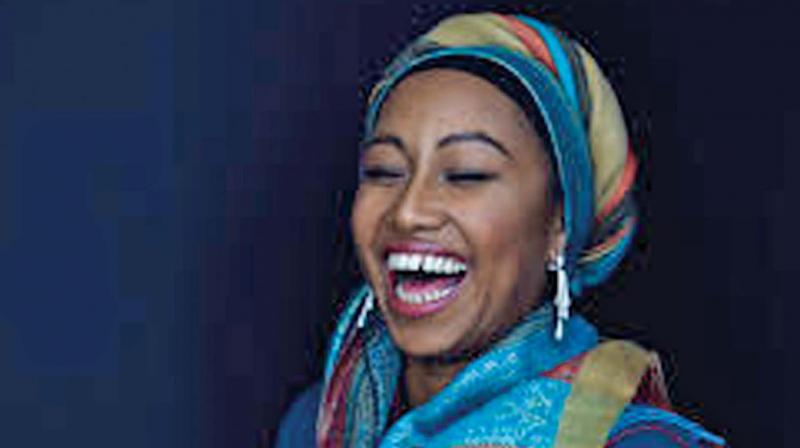No arbitrary culture bans please: Yassmin

CHENNAI: ‘Yassmin’s Story—Who Do You Think I Am’, almost sounds like a huge Cartesian challenge to the traditional narrative of memoirs itself. But when this Sudanese-born young Australian woman writer, breaking barriers since she was 16 and now author of a widely acclaimed above memoir at just 25—memoirs are usually written at the fag end of one’s life— touched down Chennai few days back, Yassmin Abdel-Magied hardly expected to see pitched battles over a sensitive Tamil cultural issue. Her passion for making ‘diversity’ the norm was unwittingly put to test as it were on a terrain she was visiting first time.
After a tremendous response to her memoir at both the Apeejay Kolkata Literary Festival (15-17 Jan) and the Jaipur Literature Festival (18-23 Jan) - “I sold a lot of copies,” she chuckles. The usually peaceful Chennai looked a dramatically different turf for her, amid the raging youth protests against the ban on Tamils’ traditional bull-taming sport of jallikattu. Marina wasn’t the old Chepauk grounds.
In a conversation with Deccan Chronicle, our attention turned to the jallikattu issue, as Yassmin identified two key challenges before Australian society now. “Australia is an example, a microcosm of what is happening more broadly,” with shifting demographics and automation changing the way people work amid growing inequality, she mused. “The other big challenge is how do you deal with indigenous history?” she posed. That steered her view of the jallikattu row as both absorbing and very complex, marking a new boundary with the debate including even the future of indigenous cattle breeds in India.
“I have no sufficient understanding of the role jallikattu plays in Tamil society,” Yassmin said. But going by the futility of top-down prescriptive approaches in engaging with ‘indigenous history’, drawing a bit from her own Australian example, the writer was emphatic that “any social change must be driven by people at the grassroots who are part of that process of change.”
“How do you keep animals safe and yet uphold your tradition?” Culture should be respected. The issues - vis-à-vis any ban will have to be “thought through comprehensively and rigorously”, including what effect the ban is going to have on people affected by the change, Yassmin elaborated.
“The protests are also seen as a proxy for a bunch of other issues people are angry about; it is really a delicate place to play in,” said Yassmin. The ground reality is nuanced, having to honour people’s cultural identity on the one hand, and also to make sure animals are treated safely. All the more reason, the “process needs to be inclusive, include the people who are affected,” Yassmin added. Every case (of ban) has to be looked at very closely and are we doing that?” she counter-posed.
A mechanical engineer by profession, now working on oilrigs in northern Australia, Yassmin thinks through women’s issues very hard, more so in the context of religious concepts coming in the way of their social mobility. “As a woman, basic things like your movement is restricted, woman’s body is policed more, while expectations about marriage and relationships do affect the rights of women,” says the writer. But at the same time, she asserts that one needs to be clear about “what the religion says about specific things” instead of going by ominous critique of anything to do with religion. For her, “social change requires a lot of sacrifice. How do I respect my culture and yet reclaim my rights?” she wonders.
Yassmin adores the example set by the youngest Nobel-winning Malala Yousafzai, in fighting for women’s education, as an iconic inspiration. Yet, in Malala’s life, “the role of her father is so important to her.” “In my own life, my basic political understanding of the world came from my father and my father’s support in my growing up has been terribly important for me,” says Yassmin. So for this writer, feminism does not mean banishing all males! Men’s support? “Yes, we need 100 per cent,” smiles Yassmin, underscoring her father’s support. “He treated my brother and me the same way; maybe, I am a different sort of feminist.”
Yassmin is optimistic about the role of Africa in a changing world order. But “Africa needs to get over its colonial history,” felt Yassmin. This excessive preoccupation with colonial history she found among some Indian writers too during the recent Lit festivals in Kolkata and Jaipur. “I am happy to be a young African woman by origin, but things like reintroducing your tribe on your ID card, those sort of things can be divisive. Sudan needs to redraw some of its boundaries,” reflected Yassmin.
While Africans yearn for leadership, “respected by the community and who value the life of its people,” Yassmin had a mixed take about the inspiring leadership provided by the former US president Barack Obama. “Yes, Obama did symbolise a new hope; but it did not translate sufficiently either in North Africa or the Middle East. The domestic Obama is different from the foreign policy Obama. The Syrian war is going to continue for a long time...we lost a generation there...that breaks my heart.” At that point of our conversation, Yassmin’s otherwise humourous, vivacious voice turned muted.

